Surviving North Korea: Laura Ling's 140 Days in Captivity
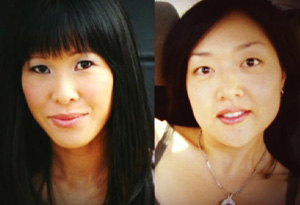
As a reporter for Current TV, Laura Ling's job often takes her to the most dangerous places in the world. On March 17, 2009, Laura and her colleague Euna Lee found themselves held captive in one of the most isolated countries in the world—North Korea.
While reporting on the thousands of North Koreans who cross the Chinese border every year to escape the country's communist regime, Laura and Euna briefly crossed into North Korea from China. After they were violently attacked by soldiers, the women found themselves in a North Korean prison—and at the center of an international standoff between the United States and one of the only countries it has no diplomatic relations with.
As Laura sat imprisoned in a foreign land, her sister, Oprah Show correspondent Lisa Ling, fought to bring her little sister home, even orchestrating top secret negotiations at the highest levels to help free Laura and Euna.
Now, the sisters are sharing their story in the memoir Somewhere Inside. In their first interview together, Lisa and Laura share the details of Laura's 140 days in captivity.
While reporting on the thousands of North Koreans who cross the Chinese border every year to escape the country's communist regime, Laura and Euna briefly crossed into North Korea from China. After they were violently attacked by soldiers, the women found themselves in a North Korean prison—and at the center of an international standoff between the United States and one of the only countries it has no diplomatic relations with.
As Laura sat imprisoned in a foreign land, her sister, Oprah Show correspondent Lisa Ling, fought to bring her little sister home, even orchestrating top secret negotiations at the highest levels to help free Laura and Euna.
Now, the sisters are sharing their story in the memoir Somewhere Inside. In their first interview together, Lisa and Laura share the details of Laura's 140 days in captivity.
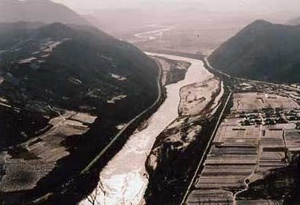
Photo: Current TV
Though they were reporting on North Korean defectors, Laura says she and Euna never intended to cross into North Korea. Laura says her team had hired a local guide to show them the Tumen River, which many North Koreans use to escape. "He knew the area well," Laura says. "He was very cautious up until that moment."
The river was frozen, and Laura says the guide led them onto the ice to get pictures of the area. "We had stepped foot on the river, just like these North Koreans do to cross," Laura says. "And our guide continued to walk closer and closer to North Korea."
Laura says the guide motioned for them to follow. "There are no signs saying, 'No trespassing.'There's no barbed wire. There's no fence. There were no guards in sight," Laura says. "But, of course, we did know that as you're crossing the river, you're getting closer and closer to the other side."
Laura says they eventually walked onto North Korean soil. "Our guide pointed out a village off in the distance and he said, 'That is where they have safe houses where these defectors stay until they're ready to be smuggled over,'" she says. "We were there for no more than a minute when we said, 'We've got to get out of here.' And we turned back."
The river was frozen, and Laura says the guide led them onto the ice to get pictures of the area. "We had stepped foot on the river, just like these North Koreans do to cross," Laura says. "And our guide continued to walk closer and closer to North Korea."
Laura says the guide motioned for them to follow. "There are no signs saying, 'No trespassing.'There's no barbed wire. There's no fence. There were no guards in sight," Laura says. "But, of course, we did know that as you're crossing the river, you're getting closer and closer to the other side."
Laura says they eventually walked onto North Korean soil. "Our guide pointed out a village off in the distance and he said, 'That is where they have safe houses where these defectors stay until they're ready to be smuggled over,'" she says. "We were there for no more than a minute when we said, 'We've got to get out of here.' And we turned back."
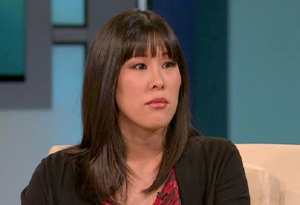
Laura says they crossed back into China—with North Korean border guards in pursuit. "About halfway across the ice, we heard yelling coming from down the river," Laura says. "I turned around and saw two North Korean soldiers with rifles running toward us."
Laura says she ran as fast as she could. "I'm on this frozen river, and just as I'm about to make it onto the Chinese soil, my boot falls into the ice," she says. "So I hurl my body onto the soil and push myself up and I continued to run, and eventually the soldiers, they chased us onto Chinese soil and apprehended us."
At one point, Laura says Euna stopped to help her. "I felt that gravity was pulling me down until I eventually couldn't run anymore. And I fell," she says. "Euna was behind me. And as she was running, she stopped. And seconds later, the guards were upon us with their guns pointed."
Laura and Euna were captured, but their guide got away. "He did come back and he was walking very slowly, and according to Euna, he said to the guards, 'Take me instead,'" she says. "But when they tried to grab him, he dashed off. So I think perhaps he was maybe trying to buy time for us to escape."
Laura says she ran as fast as she could. "I'm on this frozen river, and just as I'm about to make it onto the Chinese soil, my boot falls into the ice," she says. "So I hurl my body onto the soil and push myself up and I continued to run, and eventually the soldiers, they chased us onto Chinese soil and apprehended us."
At one point, Laura says Euna stopped to help her. "I felt that gravity was pulling me down until I eventually couldn't run anymore. And I fell," she says. "Euna was behind me. And as she was running, she stopped. And seconds later, the guards were upon us with their guns pointed."
Laura and Euna were captured, but their guide got away. "He did come back and he was walking very slowly, and according to Euna, he said to the guards, 'Take me instead,'" she says. "But when they tried to grab him, he dashed off. So I think perhaps he was maybe trying to buy time for us to escape."
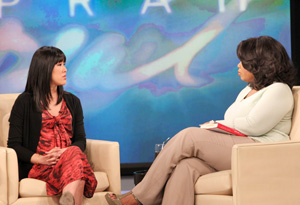
Laura says the soldiers were intent on taking them to North Korea—while she and Euna did everything they could to stay on Chinese land. "We grabbed the soil, the bushes, anything that we could cling onto to stay in China for as long as we could," she says. "I thought, 'The longer that we're here, perhaps somebody will see us and come help us.'"
Still, the women were no match for the soldiers. "There was a guard above me, he was particularly fierce," she says. "He kicked me with his boot. He knocked me in the face and the shoulder, and that just sent a shock through me. He continued to drag me across the ice, and there was a soldier upon Euna that was doing the same."
Despite their best efforts, both women were dragged across the frozen river. "I actually started yelling: 'Please, please, I'm sorry. I'm sorry. We're sorry,'" she says. "I think that only made him more upset."
As they crossed the river, Laura says the last thing she remembers is the butt of his rifle. "I looked up, I saw the rifle coming down, and I thought, 'This could be the end for me,'" she says. "The butt of the rifle struck my head, and I blacked out."
Read more about Laura's capture
Still, the women were no match for the soldiers. "There was a guard above me, he was particularly fierce," she says. "He kicked me with his boot. He knocked me in the face and the shoulder, and that just sent a shock through me. He continued to drag me across the ice, and there was a soldier upon Euna that was doing the same."
Despite their best efforts, both women were dragged across the frozen river. "I actually started yelling: 'Please, please, I'm sorry. I'm sorry. We're sorry,'" she says. "I think that only made him more upset."
As they crossed the river, Laura says the last thing she remembers is the butt of his rifle. "I looked up, I saw the rifle coming down, and I thought, 'This could be the end for me,'" she says. "The butt of the rifle struck my head, and I blacked out."
Read more about Laura's capture

Once in custody, Laura says she and Euna were only together for six of the 140 days. "It was a 5-by-6-foot cell, and there were a couple of slats on the doors. There were no bars, so you couldn't see out, and if they closed those slats, it just went completely dark," Laura says. "There was no way to communicate with the outside world."
Their top priority, Laura says, was destroying tapes and notes that contained information about their investigation. "It was the first day we were captured, and for some reason we were left alone with our belongings for a short period of time," she says. "So with guards right outside our door, we thought, 'We need to get rid of this evidence because we don't want anyone to be endangered."
Although Laura and Euna had filmed people from behind and never got their full faces, they didn't want to take any chances. "We didn't want to have this evidence out there that I was asking such subversive questions of these people about the government," she says. "We ripped up notes from the notebook, ate them, ripped up videotapes, deleted pictures and did whatever we could in the little time that we had to destroy the evidence in our possession."
Lisa, who reported undercover in North Korea in 2006, says the notes complicated Laura and Euna's case. "Americans had been detained in North Korea previously, but to our knowledge, nobody actually had any evidence on them of trying to do anything that they could perceive as trying to subvert the government," she says. "Here, these two girls were working on a piece that profiled people who had escaped from this government."
Their top priority, Laura says, was destroying tapes and notes that contained information about their investigation. "It was the first day we were captured, and for some reason we were left alone with our belongings for a short period of time," she says. "So with guards right outside our door, we thought, 'We need to get rid of this evidence because we don't want anyone to be endangered."
Although Laura and Euna had filmed people from behind and never got their full faces, they didn't want to take any chances. "We didn't want to have this evidence out there that I was asking such subversive questions of these people about the government," she says. "We ripped up notes from the notebook, ate them, ripped up videotapes, deleted pictures and did whatever we could in the little time that we had to destroy the evidence in our possession."
Lisa, who reported undercover in North Korea in 2006, says the notes complicated Laura and Euna's case. "Americans had been detained in North Korea previously, but to our knowledge, nobody actually had any evidence on them of trying to do anything that they could perceive as trying to subvert the government," she says. "Here, these two girls were working on a piece that profiled people who had escaped from this government."
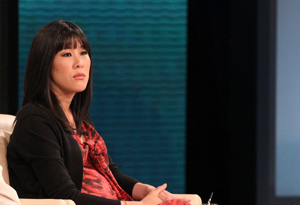
Laura and Euna were charged with illegal entry and hostile acts and transferred to North Korea's capital, Pyongyang. In the interrogation room, Laura says she was grilled about everything from her employer to her family. "One of the things that I was most fearful about was that he was questioning me and whether my company was connected to the U.S. government in any way or being bankrolled by the CIA. The chairman of Current TV is Vice President Al Gore," she says. "I had to convince them that we had nothing to do with the government."
Laura says her investigator also brought in a dossier on Lisa's 2006 visit. Lisa had entered the country legally with a medical delegation. "I had a visa in my passport," Lisa says. "I just didn't tell the North Korean officials that I was a journalist."
Laura says she tried to conceal Lisa's identity by giving them her married name. "I wanted to try to downplay everything, but they knew and they found out," Laura says. "[They] essentially said, 'Are you and your sister trying to overthrow the North Korean government?'"
Eventually, Laura told her interrogator what he wanted to hear—she was trying to overthrow the government. "I knew that that was the confession that they wanted to hear, and I was told: 'If you confess, there may be forgiveness. And if you're not frank, if you don't confess, then the worst could happen,'" she says. "It was the most difficult decision to have to do that. I didn't know if I was sealing my fate and could be sent out to a firing squad the next day. But I just had to trust that this was the right thing to do."
Laura says her investigator also brought in a dossier on Lisa's 2006 visit. Lisa had entered the country legally with a medical delegation. "I had a visa in my passport," Lisa says. "I just didn't tell the North Korean officials that I was a journalist."
Laura says she tried to conceal Lisa's identity by giving them her married name. "I wanted to try to downplay everything, but they knew and they found out," Laura says. "[They] essentially said, 'Are you and your sister trying to overthrow the North Korean government?'"
Eventually, Laura told her interrogator what he wanted to hear—she was trying to overthrow the government. "I knew that that was the confession that they wanted to hear, and I was told: 'If you confess, there may be forgiveness. And if you're not frank, if you don't confess, then the worst could happen,'" she says. "It was the most difficult decision to have to do that. I didn't know if I was sealing my fate and could be sent out to a firing squad the next day. But I just had to trust that this was the right thing to do."
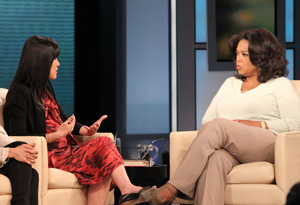
In a secret trial held on June 4, 2009, Laura and Euna were found guilty and were sentenced to 12 years of hard labor. "I was petrified," Laura says. "I had tried to prepare myself for a long sentence. I told myself this could be long. But once I heard those words, '12 years,' come from the judge, I could barely stand up straight."
The judge also told Laura there would be no forgiveness and no appeal allowed. "That's what really cut into me, because I thought, 'Could any chance of my family or my government or anybody interacting be over now if they say no forgiveness?'" she says.
Laura says she spiraled into a deep depression. "I refused my meals, and I just kind of huddled into a dark corner of the room for quite a while," she says.
When she was first taken, Laura also thought she might be pregnant. "Iain, my husband and I, had started to try to have a family right before I left," she says. "I kind of wanted to be pregnant ... because I thought that maybe I would be less alone and I would have a child there with me. And I also thought perhaps if I was pregnant, maybe this child was meant to save us and the North Koreans would have compassion and let us go."
As it turns out, Laura was not. "That just crushed me because I thought, 'I will never be able to have a family with my husband again.'"
The judge also told Laura there would be no forgiveness and no appeal allowed. "That's what really cut into me, because I thought, 'Could any chance of my family or my government or anybody interacting be over now if they say no forgiveness?'" she says.
Laura says she spiraled into a deep depression. "I refused my meals, and I just kind of huddled into a dark corner of the room for quite a while," she says.
When she was first taken, Laura also thought she might be pregnant. "Iain, my husband and I, had started to try to have a family right before I left," she says. "I kind of wanted to be pregnant ... because I thought that maybe I would be less alone and I would have a child there with me. And I also thought perhaps if I was pregnant, maybe this child was meant to save us and the North Koreans would have compassion and let us go."
As it turns out, Laura was not. "That just crushed me because I thought, 'I will never be able to have a family with my husband again.'"
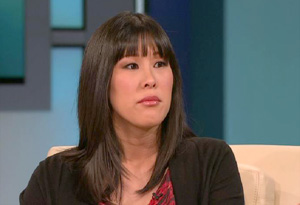
Despite her sentence, Laura was not sent to the labor camp immediately. Because of her history with painful ulcers, Laura was sent to a hospital for an endoscopy to see if she was fit to work. "I've had several [endoscopies], and I never felt a thing. [U.S. doctors] always put me under anesthesia," she says. "I said [to the North Korean medical staff,] 'Will you be putting me under?' And they said, 'It will feel just like it felt in the U.S.'"
Laura received no anesthesia. "They gave me something, and it just made me a little bit dizzy, but I could feel everything and I was completely alert," she says. "They put a device in my mouth so that I couldn't speak, and my body just began to writhe and I was releasing huge gusts of air and it was the most uncomfortable feeling."
Laura says the medical staff was only working with what they had available. "They are a very, very poor country, and that's what they used to look into my stomach and determine that I did, in fact, have an ulcer," she says. "They said that they would keep me under medical detention until my ulcer got better so that I could serve in the labor camp."
Laura received no anesthesia. "They gave me something, and it just made me a little bit dizzy, but I could feel everything and I was completely alert," she says. "They put a device in my mouth so that I couldn't speak, and my body just began to writhe and I was releasing huge gusts of air and it was the most uncomfortable feeling."
Laura says the medical staff was only working with what they had available. "They are a very, very poor country, and that's what they used to look into my stomach and determine that I did, in fact, have an ulcer," she says. "They said that they would keep me under medical detention until my ulcer got better so that I could serve in the labor camp."

In Pyongyang, Laura says she was under guard but not kept in a prison. "I was in a regular room," she says.
Still, she says conditions were less than ideal. "There were no showers. The power outages happened multiple times a day and water outages," she says. "I developed a system to wash where they would allow me to heat a kettle of water, and I would mix it with some cold water. Then I would scrub down and just splash it on me."
Laura's communication with the outside world was extremely limited, but she managed to place a few calls and send limited letters to her sister, husband and parents. She was also able to receive mail. "I tried to use my energy, every ounce of energy, to try to strategize on how I could get out of there, what I could communicate to Lisa in phone calls that they allowed us to have," she says. "But I also spent a lot of time in meditation, doing yoga."
Laura says knowing she wasn't the only person who had been wrongly sentenced to the labor camps also helped her keep going. "I tried to think that there are so many innocent people that are enduring this right now," she says. "That gave me strength. If these people are undergoing this, then I can try to muster up the strength to get through it as well."
Still, she says conditions were less than ideal. "There were no showers. The power outages happened multiple times a day and water outages," she says. "I developed a system to wash where they would allow me to heat a kettle of water, and I would mix it with some cold water. Then I would scrub down and just splash it on me."
Laura's communication with the outside world was extremely limited, but she managed to place a few calls and send limited letters to her sister, husband and parents. She was also able to receive mail. "I tried to use my energy, every ounce of energy, to try to strategize on how I could get out of there, what I could communicate to Lisa in phone calls that they allowed us to have," she says. "But I also spent a lot of time in meditation, doing yoga."
Laura says knowing she wasn't the only person who had been wrongly sentenced to the labor camps also helped her keep going. "I tried to think that there are so many innocent people that are enduring this right now," she says. "That gave me strength. If these people are undergoing this, then I can try to muster up the strength to get through it as well."
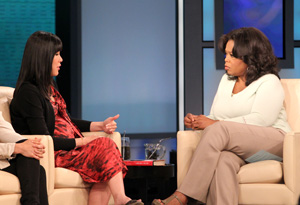
During her captivity, Laura says she was able to connect with some of her guards. "One of them wanted to know, 'Is it true that Americans go to bars and pick up on each other and go home and have sex?'" Laura says. "I said: 'Well, that does happen. Does that happen here?' And she said, 'Oh, no, no.' They live in the most conservative society."
Laura says she taught curious guards a few yoga poses but drew the line at sharing fashion magazines she got in the mail because their content was usually banned in the country. "I said: 'If you're allowed to have this, then, please. But if you're not, I can't keep a secret,'" she says. "She understood, and she gave the magazine back to me."
Laura says she taught curious guards a few yoga poses but drew the line at sharing fashion magazines she got in the mail because their content was usually banned in the country. "I said: 'If you're allowed to have this, then, please. But if you're not, I can't keep a secret,'" she says. "She understood, and she gave the magazine back to me."
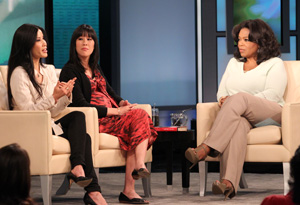
Still, the most important relationship Laura developed was with her investigator. "In the beginning, he was very, very stern. One look from him could send me into a state of nervousness and fear," she says. "But over time, I feel like I developed a relationship with him and that he wanted me to go home. And he was trying to convey information to me that I could convey to Lisa that might help me get home."
The interrogator told Laura that the United States needed to send an envoy to negotiate her release. "At one point, we were talking about who would be an acceptable envoy," she says. "And I was trying to say, 'Well, what about the chairman of my company, Vice President Gore?'"
Instead, President Barack Obama was suggested. "I said, 'Sir, with all due respect, if you think President Obama is going to come here, you might as well send me to the camp right now," she says. "And he said, 'Well, what about past presidents?' That's how President Clinton's name evolved."
Laura convinced her interrogator to let her call Lisa to relay the information. Soon, the sisters were the only channel through which the governments of both countries were communicating. "It was unprecedented [that] they let Laura call me," Lisa says. "That's how the information was getting across, and that's how eventually it was communicated from Laura to me that the envoy had to be Bill Clinton."
The interrogator told Laura that the United States needed to send an envoy to negotiate her release. "At one point, we were talking about who would be an acceptable envoy," she says. "And I was trying to say, 'Well, what about the chairman of my company, Vice President Gore?'"
Instead, President Barack Obama was suggested. "I said, 'Sir, with all due respect, if you think President Obama is going to come here, you might as well send me to the camp right now," she says. "And he said, 'Well, what about past presidents?' That's how President Clinton's name evolved."
Laura convinced her interrogator to let her call Lisa to relay the information. Soon, the sisters were the only channel through which the governments of both countries were communicating. "It was unprecedented [that] they let Laura call me," Lisa says. "That's how the information was getting across, and that's how eventually it was communicated from Laura to me that the envoy had to be Bill Clinton."

Photo: AP
On August 4, 2009, former President Bill Clinton traveled to North Korea to negotiate Laura and Euna's release. Laura says she first heard of his presence when walking down a hallway. "It was surreal," she says. "I was walking down a hallway with dozens of North Korean security agents, and I see this bald American with an earpiece, [a] Secret Service agent, and I just felt the presence of my country."
Watch Laura remember this pivotal moment
Laura and Euna were ushered into a room where they saw President Clinton. "The doors opened, and there he was," Laura says. "[It] felt like it was this angelic figure that had come to save us." Laura says the president looked stoic and extremely serious. "When we first saw each other, he was so fatherly and concerned. He wanted to make sure that we were okay," she says. "He said, 'God bless you.'"
"I said to him: 'President Clinton, we've apologized for what we've done. I hope that you can do the same and apologize on our behalf,'" she says. "He said: 'That's been done. I still have a little bit more work to do, but I hope and I believe that you will be on that plane with us tomorrow.'"
Watch Laura remember this pivotal moment
Laura and Euna were ushered into a room where they saw President Clinton. "The doors opened, and there he was," Laura says. "[It] felt like it was this angelic figure that had come to save us." Laura says the president looked stoic and extremely serious. "When we first saw each other, he was so fatherly and concerned. He wanted to make sure that we were okay," she says. "He said, 'God bless you.'"
"I said to him: 'President Clinton, we've apologized for what we've done. I hope that you can do the same and apologize on our behalf,'" she says. "He said: 'That's been done. I still have a little bit more work to do, but I hope and I believe that you will be on that plane with us tomorrow.'"
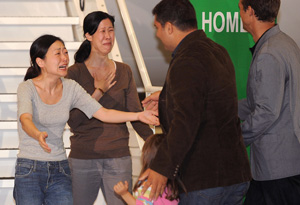
Photo: Robyn Beck/AFP/Getty Images
After speaking with President Clinton, North Korean leader Kim Jong-Il pardoned Laura Ling and Euna Lee. The women were reunited with their loved ones after five months in captivity. "The only person that could come to our rescue was President Clinton," Laura says. "We are so, so appreciative that he was willing to do so."
Lisa says she even teased the president for looking so serious once her sister was home safe. "I said, 'Nice face when you arrived in North Korea.' Because usually he's jovial and happy-go-lucky," she says. "He said, 'I had to practice that.' He didn't want the world to see that he was there for fun in any way."
Lisa says she even teased the president for looking so serious once her sister was home safe. "I said, 'Nice face when you arrived in North Korea.' Because usually he's jovial and happy-go-lucky," she says. "He said, 'I had to practice that.' He didn't want the world to see that he was there for fun in any way."
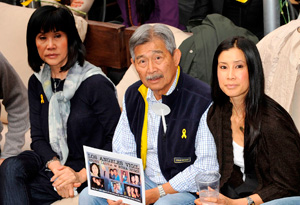
Photo: Getty
Throughout her ordeal, Laura says she was angry with herself for putting her family through such trauma. "I would go into the bathroom and look at myself in the mirror and think, 'Who are you and how did this happen?'" she says. "I slapped myself because I wanted to punish myself for putting my family through this. And I thought about that every day and the pain that they must be feeling. That was the hardest thing for me."
Back home, Lisa says her devastated family never lost hope that Laura would be freed but feared for her safety. "There were so many unprecedented aspects of this—no Americans had ever been tried in North Korea's Supreme Court. No American had ever been sentenced to 12 years hard labor," Lisa says. "Plus, North Korea was firing nuclear weapons at this time. It was a very, very tense period."
Lisa says from the moment she heard about Laura's capture, she called everyone she knew for help. "I knew that we were in a really, really difficult situation," she says. "There's so little our government can do because this is a country with which we have no diplomatic relationship. You can't just call someone and say, 'Can we discuss this situation?'"
Lisa says her parents were beside themselves. "My mom just stopped showering, and Iain had to tell her to take a bath and change her clothes one day," she says. "Our father who's usually a very kind of funny guy, cracking jokes all the time. ... The hardest thing is to hear your father cry. Just relentlessly crying is really a painful thing."
Back home, Lisa says her devastated family never lost hope that Laura would be freed but feared for her safety. "There were so many unprecedented aspects of this—no Americans had ever been tried in North Korea's Supreme Court. No American had ever been sentenced to 12 years hard labor," Lisa says. "Plus, North Korea was firing nuclear weapons at this time. It was a very, very tense period."
Lisa says from the moment she heard about Laura's capture, she called everyone she knew for help. "I knew that we were in a really, really difficult situation," she says. "There's so little our government can do because this is a country with which we have no diplomatic relationship. You can't just call someone and say, 'Can we discuss this situation?'"
Lisa says her parents were beside themselves. "My mom just stopped showering, and Iain had to tell her to take a bath and change her clothes one day," she says. "Our father who's usually a very kind of funny guy, cracking jokes all the time. ... The hardest thing is to hear your father cry. Just relentlessly crying is really a painful thing."
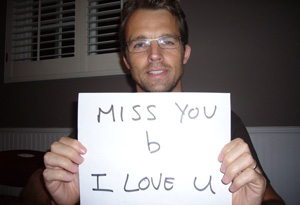
Laura says she especially worried about her husband, Iain, while in captivity—and even began imagining other women he could spend his life with. "It was so hard and painful for me to do that, but I didn't want my husband to be alone. I wanted somebody to be there to take care of him and he could share a life with," she says. "I didn't want him to have to serve a sentence along with me, so I would picture in my head who I thought might be acceptable."
Iain, however, thought of no one but his wife. "Everyday at 5, I would write to Laura," he says. "She suggested that that could be our time where she would think about me and I would think about her. So I'd write to her and I'd tell her about what was going on during the day."
Laura devoured every word . "Those letters meant everything to me," Laura says. "They were my oxygen. They kept me going."
Iain says the hardest thing about Laura's experience was never knowing how she really was. "We'd recently bought a house and we'd moved in, and I would come home to that house every day after work. There would be reminders of Laura there and yet it would be empty," he says. "I'd sleep for a couple of hours, I'd wake up, search the Internet, look for news. Maybe email Lisa. So that was really the hard [part]—not knowing where she was. What she was doing. How she was."
Today, Laura and Iain's future is looking brighter than ever. In June 2010, Laura will give birth to their first child.
Iain, however, thought of no one but his wife. "Everyday at 5, I would write to Laura," he says. "She suggested that that could be our time where she would think about me and I would think about her. So I'd write to her and I'd tell her about what was going on during the day."
Laura devoured every word . "Those letters meant everything to me," Laura says. "They were my oxygen. They kept me going."
Iain says the hardest thing about Laura's experience was never knowing how she really was. "We'd recently bought a house and we'd moved in, and I would come home to that house every day after work. There would be reminders of Laura there and yet it would be empty," he says. "I'd sleep for a couple of hours, I'd wake up, search the Internet, look for news. Maybe email Lisa. So that was really the hard [part]—not knowing where she was. What she was doing. How she was."
Today, Laura and Iain's future is looking brighter than ever. In June 2010, Laura will give birth to their first child.
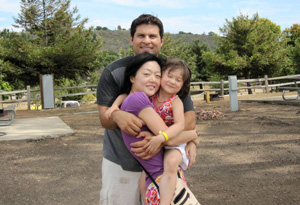
Since their homecoming, Laura says she is still close to Euna Lee. "Euna is doing well. We talk frequently," Laura says. "She's spending a lot of time with her husband, Michael, and their adorable daughter."
Laura says Euna is also working on a book detailing her experience in North Korea. "Euna and I spent a total of six days together in captivity, and I will forever regard Euna as a member of our family. But Euna has a different story to tell," she says. "So she'll be writing about how she got through that, and I'm anxious to read what she has to say."
Laura says Euna is also working on a book detailing her experience in North Korea. "Euna and I spent a total of six days together in captivity, and I will forever regard Euna as a member of our family. But Euna has a different story to tell," she says. "So she'll be writing about how she got through that, and I'm anxious to read what she has to say."

Some critics say Laura and Euna's reporting was irresponsible and that they shouldn't have been near the border. "I was on an assignment to tell a story for Current TV about a crisis that is taking place, and I wanted to raise awareness about the horrific conditions in North Korea and what these desperate people are fleeing," she says. "That story was never able to be told. I hope that this book can shine a light on that, as well as what happened during my captivity."
Lisa says she's more determined than ever to finish telling the story her sister started. "It was so traumatizing that [Laura] has wanted to slow down a bit. I, on the other hand, am kind of crazier than ever to want to expose things and report," Lisa says. "I have become even more determined than ever to try and raise awareness. There's a real crisis, and we continue to hope that people, through Laura and Euna's experience, will want to become more aware of this humanitarian crisis on the border of North Korea and China."
Lisa says she's more determined than ever to finish telling the story her sister started. "It was so traumatizing that [Laura] has wanted to slow down a bit. I, on the other hand, am kind of crazier than ever to want to expose things and report," Lisa says. "I have become even more determined than ever to try and raise awareness. There's a real crisis, and we continue to hope that people, through Laura and Euna's experience, will want to become more aware of this humanitarian crisis on the border of North Korea and China."
Keep Reading






